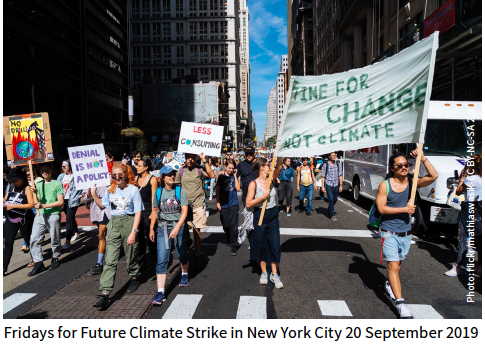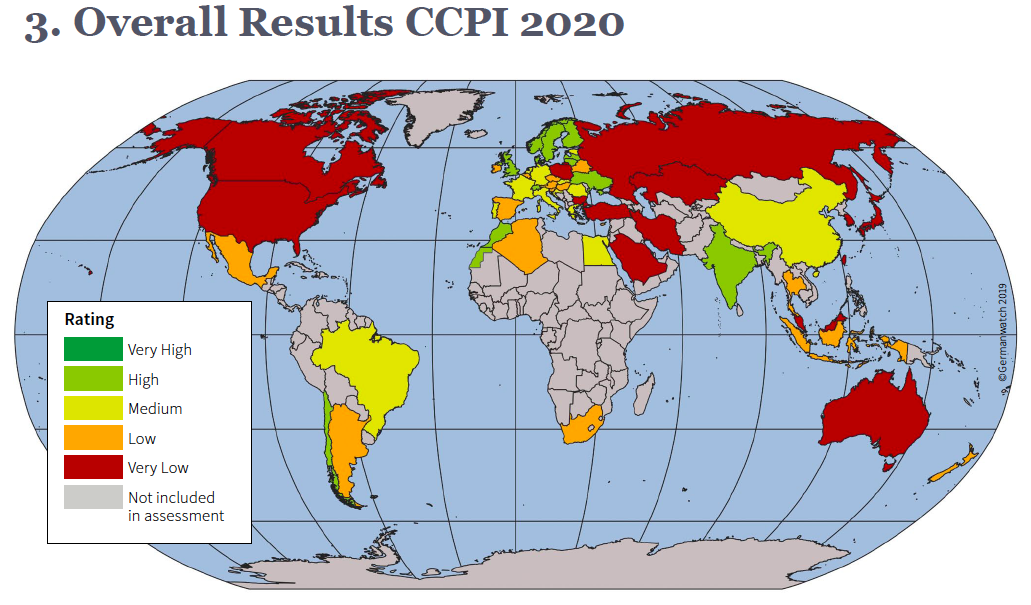In the Reports section of the April 2019 issue of irishenvironment.com we wrote about “Ireland is Still Lagging on Climate Change.” The report was a discussion of the 2018 and 2019 Climate Change Performance Index (CCPI), an annual assessment by several European think-tanks of 61 countries and their performance on several factors: greenhouse gas (GHG) emissions; renewable energy take-up; energy use; and, climate policy.
In 2018 and 2019, Ireland was ranked 48th out of 60 countries on the Index, the lowest in the European Union. The Taoiseach Leo Varadkar acknowledged in January 2018 that Ireland was falling behind the rest of Europe on addressing climate breakdown, and that it was a laggard on this issue. We agreed with his assessment, but suggested that “laggard’ was too kind a word to apply.

In the recent 2020 Index, Ireland “climbs up” to place 41st of 61 countries, from a group of “very low” to “low” performers.
The low ranking derives in large part because of the low score on GHG emissions. This factor accounts for 40% of the weight in the Index’s assessment methods. Ireland’s GHG per capita emissions are at high level, and it is unlikely to meet its 2030 and 2050 GHG targets. These shortcomings are largely the result of little progress in addressing agriculture, road transport or residential energy. As always, the government’s agenda is driven by its unbending protection of the agriculture sector.
Ireland also ranks low on the “climate policy” dimension, especially for its national climate policy. While recent actions, e.g., introducing legally-binding 5-year carbon budgets, reflect some advance in national policy, the report submits that the government needs to ratchet up its ambitions.
The climb up from the EU bottom is largely the result of an increase in the share of renewable energy, yet the report finds that even here Ireland is deficient in its renewable support schemes.

Some might suggest that maybe it is not fair to criticize the government since it has recently seemed to be taking certain steps to improve on climate action. Less criticism might be in order if those steps reflected a transformation. Unfortunately they look suspiciously like Green Washing rather than any substantive change of heart or mind.
Despite the major contribution of methane from the agricultural sector to Ireland’s GHG emissions, the government has not proposed any meaningful, concrete policies or plans to address those agricultural methane emissions. Much of this protection applies to the large agri-food businesses rather than hillside family farmers.
Moreover, the government’s announcements of its ban on exploration for oil in Irish waters was made in New York at the opening of the UN General Assembly, and UN special Summit on climate action. The pitch was that Ireland would become one of the first countries to phase out exploration in order to move toward carbon neutrality by 2050. In reality, finding oil off Ireland had not been much of a viable project, and so little was sacrificed by the government. It also retained the policy of supporting exploration and production of natural gas. A better contribution to the climate Summit would have been the announcement of viable plans to reduce or eliminate methane from the agriculture sector.
Recent actions by the government reinforce concerns about its bona fides in claiming progressive polices and practices with regard to climate breakdown. For both its long-term strategy to reduce greenhouse gas (GHG) emissions and its Heads of the Housing and Planning Development Bill, both with significant implications for addressing climate breakdown, the government attempted to rush through public consultations with little realistic opportunity for the public to comment. For the former, the government originally allowed only 15 working days for public consultation, and for the latter planning bill it allowed just 23 working days, both to occur during the holiday period. Widespread protest at such short periods, especially during the holidays, to comment on important and complicated policies and practices pressured the government to extend the consultation periods.
When all is said and done, there is just not any enthusiasm evident from the government for setting proactive policies or taking progressive actions. The government’s position seems to be a matter of doing only what is minimally necessary to ward off too much public criticism, or electoral pushback. In light of the brutal impacts from climate breakdown that we see unfolding before our eyes that is woefully irresponsible.
If Ireland’s ranking on the Index has inched up, it has done so only as a result of policies and actions that are begrudgingly adopted.
Sources
Jan Burck, Ursula Hagen, Niklas Höhne, Leonardo Nascimento, Christoph Bals, Climate Change Performance Index: Results 2020 (German Watch, Climate Action Network, New Climate Institute). bit.ly/2tOvLoo
Kevin O’sullivan, “Ireland improved on climate change last year, report says: Ireland climbs from ‘very low’ to ‘low performer’ status in performance index,” The Irish Times (10 Dec 2019). bit.ly/2ErZNjM
Dr. Diarmuid Torney, “Missed opportunity for societal dialogue on climate crisis,” Green News.ie (3 Dec 2019). bit.ly/2YXLbSO
Niall Sargent, “Oil exploration to end but not gas, confirms Taoiseach,” Green News.ie (23 Sept 2019). bit.ly/2Q93ccP
Niall Sargent, “Minister bows to pressure to extend consultation on ‘flawed’ planning Bill,” Green News.ie (20 Dec 2019). bit.ly/2MEY6nP


No comments yet, add your own below